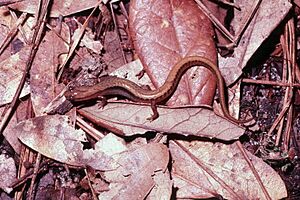Southeastern dwarf salamander facts for kids
Quick facts for kids Southeastern dwarf salamander |
|
|---|---|
 |
|
| Conservation status | |
| Scientific classification |
|
| Kingdom: | Animalia |
| Phylum: | Chordata |
| Class: | Amphibia |
| Order: | Urodela |
| Family: | Plethodontidae |
| Genus: | Eurycea |
| Species: |
E. quadridigitata
|
| Binomial name | |
| Eurycea quadridigitata (Holbrook, 1842)
|
|
| Script error: The function "autoWithCaption" does not exist. | |
| Synonyms | |
|
|
Script error: No such module "Check for conflicting parameters".
The southeastern dwarf salamander (Eurycea quadridigitata) is a small species of salamander. It lives in the southern United States. You can find it from southern North Carolina down to northern Florida. Some also live from southwestern Alabama to eastern Louisiana. People sometimes call it the four-fingered manculus or the Florida dwarf salamander.
Contents
Discovering Different Kinds
For a long time, scientists thought there was only one type of southeastern dwarf salamander. But in 2017, they looked closely at the salamanders' DNA. They found that what seemed like one species was actually five very similar ones! These are called "cryptic species" because they look almost identical.
Scientists gave new names to these different groups. Each group lives in slightly different areas. This shows how much we can learn about animals by studying their genes.
What Does It Look Like?
The southeastern dwarf salamander is quite small. It usually grows to be about 2 to 3.5 inches long. It has a thin body and a long tail.
Its color is often yellow-brown. It might have darker brown spots or stripes along its sides. The way it looks can change a lot from one salamander to another. The name quadridigitata means "four fingers." This is because each of its feet has four toes, which is a special feature!
Where Does It Live and What Does It Do?
These salamanders love swampy pine woods. They are nocturnal, meaning they are active at night. During the day, they usually hide under leaves or other things on the forest floor. This keeps them safe and moist.
Reproduction and Life Cycle
Southeastern dwarf salamanders breed in the fall. The female salamander lays between 12 and 48 eggs. She lays them one by one or in small groups. She attaches them to things that are underwater. This usually happens in shallow, slow-moving, or still water.
 | Lonnie Johnson |
 | Granville Woods |
 | Lewis Howard Latimer |
 | James West |


